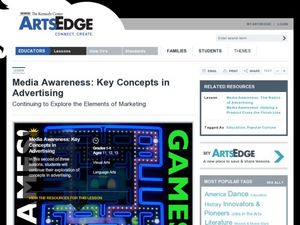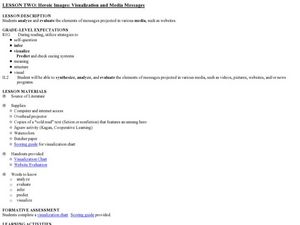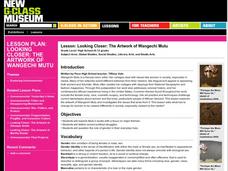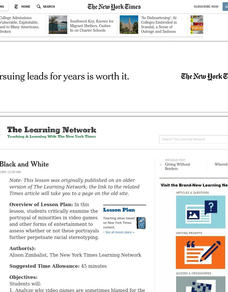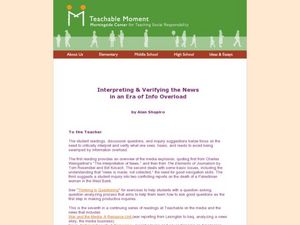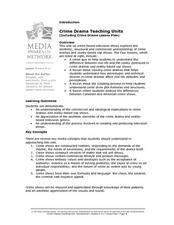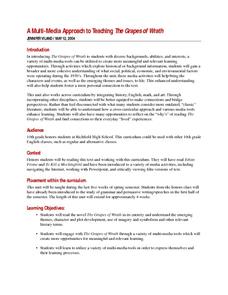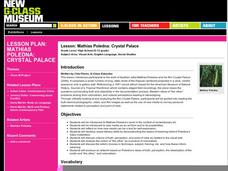Curated OER
Children's Media and Censorship
High schoolers form opinions about children and television censorship after analyzing literature. They complete a journal writing activity to identify the topic and make a list of inappropriate television shows for children. Next, they...
Curated OER
Media/Book Review
Young scholars act as media critics to analyze the portrayal of the elderly in media. For this ethics lesson, students use the Internet to research ageism. They decide if various media depict elderly characters positively or negatively.
Curated OER
Is the media aiding Global Peace when reporting on religion?
Students play 'telephone' to simulate communication difficulties. In this media analysis lesson, students read and analyze newspaper articles related to religious tensions between the Pope and Muslims. Students evaluate the media's...
Curated OER
Rules of Conduct: Media Violence, Dating and Teenage Behavior
Learners discuss the role of media in their lives and making decisions. In groups, they define violence and identify how it is represented in the type of entertainment they are accustomed to viewing. They compare and contrast behaviors...
Curated OER
Media Awareness: Key Concepts in Advertising
Students examine the basic concepts of advertising. In this media awareness lesson, students discuss target audience, art, and purpose in advertising to determine what makes an advertisement effective or ineffective. Students evaluate...
Curated OER
Heroic Images: Visualization and Media Messages
Students examine media messages. In this media awareness lesson, students analyze online messages about heroism as they complete a jigsaw reading activity.
Curated OER
Lesson: Looking Closer: The Artwork of Wangechi Mutu
Social issues of gender and media stereotypes, begins with a multi-sensory experience. Learners view the painting Backlash Blues and make critical comments based on what they see. They then read the Langston Hughes poem and listen to the...
Curated OER
Beyond Black and White
Students critically examine the portrayal of minorities in video games and other forms of entertainment and assess the role of racial stereotyping. They keep a log of media minority portrayals and respond to their findings.
Curated OER
Savvy Surfers: Website Evaluation and Media Literacy
Sixth graders strengthen their understanding of what a high quality website is composed of. Learners evaluate three websites for accuracy, credibility, and reliability by completing a chart.
Facebook
Online Presence
What happens when an online post gets the wrong kind of attention? Learners evaluate the good, the bad, and the occasionally ugly side of social media posting with a instructional activity from a vast digital citizenship series. After...
Curated OER
Interpreting & Verifying the News in an Era of Info Overload
Learners practice their critical thinking skills. In this media awareness lesson, students read articles about media overload and interpretation of media. Learners respond to discussion questions and discuss how they verify news....
Curated OER
Expressive Self Portrait - Mixed Media
Learners create self-portraits using prior artistic knowledge and personal experiences. Emphasis is placed on the works of Albrecht Durer, Vincent Van Gogh, Pablo Picasso, Frida Kahlo, Romare Bearden, and Chuck Close for inspiration.
Curated OER
Crime Drama Teaching Units
Investigate the nature of crime dramas on television. What exactly are they trying to portray? Questions and a comparison chart support learners as they watch shows from Canada, Great Britain, and the United States. An oral presentation...
Media Smarts
Media Awareness Network: Hate or Debate?
Discuss the difference between legitimate debate on a political issue and arguments that are based on hate through a science-fiction scenario that shows how a controversial issue can be discussed in both ways. Then learn how purveyors of...
Curated OER
Vanishing Verbs
Students analyze recent media trends, and develop critical thinking skills by summarizing main ideas, extracting details, formulating opinions, drawing inferences, and comparing and contrasting attitudes. They also practice paraphrasing...
Curated OER
A Multi-Media Approach to Teaching The Grapes of Wrath
Integrate history, math, and art into a study of The Grapes of Wrath with a series of activities that ask learners to investigate the social, political, economic, and environmental factors at play during the 1930s. Designed to be used...
Curated OER
Political Cartoons: Literacy
Readers decode and deconstruct political cartoons to heighten critical thinking, extra-textual literacy, and making meaning from symbolism and metaphor. A compatible activity to use in English class when your 8th or 11th graders are...
Curated OER
Lesson: Mathias Poledna: Crystal Palace
Film analysis takes critical thinking, connections, and context. Upper graders look at the film installation, Crystal Palace in terms of the film makers choices, presentation, and perspective of truth. After an analytical discussion of...
Media Education Lab
Understanding Viral Messages
Imagine advertising for a product but not being paid to do so. Welcome to the world of Viral Messaging. Class members first view a T-Mobile flash mob video that went viral and has been seen by over 14 million viewers. After analyzing the...
Media Smarts
Sex in Advertising
Converse with your class about the use of sex in advertising. Analyze the biological, emotional, and spiritual connections associated with sex, and how the media uses these affiliations to sell products. Take a closer look at...
Curated OER
Minding the Media
Students reflect on the fairness of rating movies, television, radio, books, magazines, Web sites and other media. They submit their own entries for a media rating guide.
Curated OER
Media Literacy: TV - What You Don't See!
Students examine how to evaluate what they are watching on television. They discuss hip hop music videos, compare/contrast them to other types of music videos, write a letter or press release about promoting positive teen stories, and...
Curated OER
Focus on the Media
Young scholars critically examine news articles and editorials for attitudes of discrimination and prejudice. Students then complete checklist in which they analyze news reports for context, content, point of view, language, graphics,...
Media Education Lab
Propaganda Techniques
In an age of fake news, alternative facts, and biased reporting, it is more important than ever that 21st century learners develop the critical-thinking skills necessary to recognize, analyze and resist the propaganda techniques used in...






